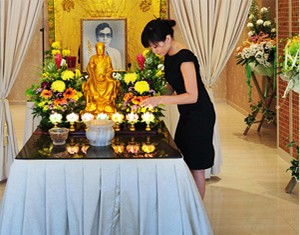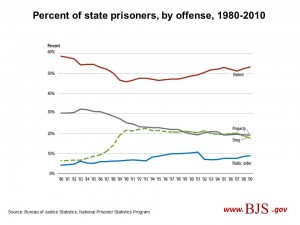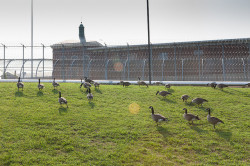This has been a bit of a summer of upheavals for me, personally, so I hope you readers won’t mind a personal note to this post. After two years of having the privilege to work with the teachers and student scholars of the JCI Prison Scholars Program, I’ve finished my last class – at least for a long while. I had been planning on taking a break from teaching this Fall to focus on some other work (including some writing on criminal violence in the US that will eventually show up in the drafts available to patrons) already, but as it turns out I will not be living in Baltimore after that – I will be taking up a post with the Centre for Conflict Resolution in Cape Town, South Africa.
I walked out on my last day, somewhat anticlimactically, since a lot of folks had already left to not lose their place in the dinner line. But at the very least Mr. Greco, Jamaican Eddie, Mr. Epps, Craig Muhammed, Kelly, and Mr. Horton had hung around to chat, like they usually do. I told them I hoped that if I came back to Baltimore in four or five years, that the program would still be going and I could teach again – though I hoped I wouldn’t see any of them in my classes. And I tried, and failed, to master the “snap” one last time.
While my departure from JCIPSP was not really planned, I suppose it’s fitting that I’m leaving just after completing my summer course on the wars in the Democratic Republic of Congo. Ever since Conrad used the phrase “heart of darkness” to refer to the Congo, it’s been the lazy go-to label for any place where affluent, mostly white folks go to try to help the natives and have their faith in humanity tested, including prisons (though I see the tagline on the article profiling Mikita Brottman’s work has been changed, which is cool).
The thread that runs through my own work, and links studying the wars in Congo and teaching in prisons, is a resistance to that sort of thinking about the people who live in war zones (declared or not quite declared). First and foremost, people are people. Warlords and child soldiers, prisoners and guards, civilians and politicians, all make decisions for reasons that are ultimately understandable if we take the time to look at them. Back when I started studying African security issues seriously, I had lunch with an old mentor and was describing the situation in the DRC to him, and his response was “sounds like they need some adult supervision.”
We haven’t spoken since.
The reason I used Stearns’ book for this course (even though it’s a bit less systematic and detailed than the gold standard on the war, Prunier’s massive Africa’s World War) is precisely that it humanizes the conflict for people who are learning about it. Stearns builds his book around the narratives of people who were caught up in the war – some of them were leaders of brutal military units or equally brutal paramilitaries, some were businesspeople, some were child soldiers, or just civilians trying to get by. But throughout the book he makes a point of showcasing people’s stories of why they did what they did. Civilian members of a small religious sect that stayed near where their founder had set up worship. Kinyarwandan-speaking Congolese whose parents urged them to cross the border and become child soldiers. A Hutu police chief during the genocide who kept his position while their colleagues engaged in mass murder, but maintained his own clean hands – then went to war against the new Rwandan regime.
I did my best, with mixed success, to replicate that approach in the class itself. We talked a lot about the personal narratives in the book, and how it related to other kinds of violence. Some of the guys would bring up ways in which the situation of people in DRC reminded them of their own situation, as guys who had gotten involved in violence here in the US. My big regret from the class is that I never quite managed to dig deeply into those stories and connections – we very quickly tended to end up relating things from the DRC to other large-scale current events the guys saw parallels to – Gaza, Ukraine, Iraq, or Ferguson. It seemed sometimes that they were more comfortable talking about those sorts of “current events” – or perhaps deep down I was more comfortable talking about them. If I’ve learned anything from my time teaching at JCIPSP, it’s that really listening to your students is much tougher than it seems. I’d walk in every class intending to do it, and find at least three points at which I’d failed when I did my internal post-mortem on the drive home. I also tried to give them writing assignments that took a similar approach of bringing big ideas down to earth through relationship with relatable stories (a history-teaching technique imparted to me by my colleague Rachel Donaldson) – asking them, e.g., where they would go and what they would bring if war had broken out where they lived before coming to prison. Not everyone did the writing assignments, but I’ll post some of them as I transcribe them.
If there were two bits of the class that made me feel like I’d done some of my job correctly, here they are. First, there are a lot of African immigrants here in Maryland, many of whom left to avoid wars at home. A good number of them have become guards at JCI, it seems. Several times, guys in my class told me that a guard had seen them carrying a copy of the book, or heard them talking about DRC (or Liberia, which I discussed in a previous class) and expressed warm surprise that my students actually knew something about the guards’ homelands. And the students told me that – like most Americans – many of them hadn’t really known much about what was going on in Africa before taking classes with me, so it gave them a new understanding of the situations a number of the guards were coming from. I’m told that this has led to a number of good conversations. So, if I’ve helped some of my students and some of the guards improve the humanity of their relationships a little, that’s at least as important to me as if anyone remembers the difference between the RPF and the RCD a year from now.
Second, somewhat weirdly, I think I may have humanized some of the decision-makers in foreign policy a bit. One constant in our classes has been the prevalence of conspiracy theories. This is especially true when you’re talking about the DRC and its neighborhood, where Mobutu was in fact put into power by a CIA conspiracy (among other conspirators), and where one of the main players in the war, the Rwandan Patriotic Front, began its life as a conspiracy within the Ugandan military, backed by the US. So there’s a tendency for a lot of my students to want to find the way that the US created the war (or any other problem) in order to get money or kill non-whites. By the end, I think I managed to convince at least some of them that greed and racism are real drivers of stuff in the world, but it’s not always that simple – just as the people in Congo aren’t Conrad’s monstrous savages, the powerful actors involved are often venal or misguided or biased, but rarely vampires. If you go hunting for the monsters, you’ll miss the more systematic aspects of what goes wrong in places like Congo – or Baltimore or Ferguson, for that matter.
In the end, I am not sure how much I helped – and you’ll probably be better served by reading some of my students’ writing than this long and self-indulgent reflection. I’m always a little bit embarrassed by the kind words and certificates that are handed to me at the end of classes that I teach. This semester, knowing I was leaving, Mr. Greco also made up a sort of “lifetime achievement” certificate that honors me for “standing in the gap against international, national, and local crimes of police, armed forces and terroristic brutality; and for teaching those who society devalues.” I’m not sure I do any of that. I’m pretty sure I haven’t stopped any police violence or reformed any paramilitaries lately.
And I’m not sure even about the last part. We struggle, in this program, with the concept of “teaching.” It is very possible that we are fooling ourselves into thinking we have done real good, real pedagogical work in the deepest, most empowering sense of the term, when really all we have done is have intense experiences for ourselves. That’s the danger of the Heart of Darkness paradigm for liberals. There’s a more charitable read of Conrad’s work, where Congo isn’t the titular heart of darkness itself, but a place where the darkness at the heart of European colonialism is revealed, and destroys the world around it in the revelation. But if you read it that way, and congratulate yourself on your anti-racism, you risk missing the fact that even that reading turns the Congolese from savages into bit players in the white journey of self-actualization and improvement. I mean, it’s an upgrade, but, still… enh. We are all trying our best to make this project about more than our personal journeys, but we probably only intermittently succeed.
The other thing is the bit about society devaluing men in prison. This is sort of true, and sort of not. I have already talked a lot about the way in which the communities from which incarcerated men tend to come are profoundly disconnected from the community that I live in, and that many of you readers live in. I know many of the guys talk about being cut off from their families. I’m terrible to get on the phone, and I know that for people who can’t email me, that often makes my commitment look less than steadfast. I know these things matter for building those human relationships and I fail as often as anyone else, if not more so. But I also see folks waiting in the visiting room every time I go to teach. Incarceration has a profound effect on those communities I’m not a part of, and the loss of the value of the men in prison is keenly felt there. If “society” doesn’t value people in prison, we’re using “society” in a way that implicitly excludes a lot of people who live only a stone’s throw away from me here in Baltimore. And highlighting the way that the “society” I go home to when I’m done teaching in the prison is deeply and constantly involved in a process of exclusion and devaluation.
Hello, heart of darkness.
 Ruth was truly the personification of someone who came to give a good lecture on Death’s rituals and customs. From her black attire to her mysterious tones and emphases that she used to describe certain events, she really came prepared to give a lecture on the subject of making the transition from life to afterlife. I’ve never hear the subject of death be described so eloquently. Ruth’s presentation was conducted so well that it actually seemed rehearsed, even to the asking of our unsuspecting questions. She presented us with Singapore’s complete traditions and rituals in detailed descriptions, beginning with the death of the person straight through to the embalming process. She also spoke somewhat discontentedly on the government-ordered ten-year exhumations.
Ruth was truly the personification of someone who came to give a good lecture on Death’s rituals and customs. From her black attire to her mysterious tones and emphases that she used to describe certain events, she really came prepared to give a lecture on the subject of making the transition from life to afterlife. I’ve never hear the subject of death be described so eloquently. Ruth’s presentation was conducted so well that it actually seemed rehearsed, even to the asking of our unsuspecting questions. She presented us with Singapore’s complete traditions and rituals in detailed descriptions, beginning with the death of the person straight through to the embalming process. She also spoke somewhat discontentedly on the government-ordered ten-year exhumations.


 Where I find McKenna helpful is, first, in her claim that end-state disagreements tend to be associated with masculine utopias, while feminist utopias emphasize ends-in-view (which jives with my readings of the relevant science-fiction utopias, and also of polital theories that have utopian elements), and second, in her Dewyan typology for judging ends-in-view. According to McKenna’s reading of Dewey, there are five criterion (five questions, really) by which we can judge an end-in-view:
Where I find McKenna helpful is, first, in her claim that end-state disagreements tend to be associated with masculine utopias, while feminist utopias emphasize ends-in-view (which jives with my readings of the relevant science-fiction utopias, and also of polital theories that have utopian elements), and second, in her Dewyan typology for judging ends-in-view. According to McKenna’s reading of Dewey, there are five criterion (five questions, really) by which we can judge an end-in-view:

